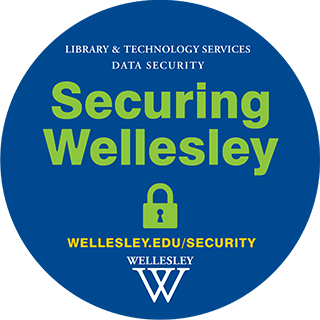National CyberSecurity Awareness Month 2020 is here!

Celebrate NCSAM and Do Your Part. #BeCyberSmart
 Tips for Working, Teaching, & Learning Remotely
Tips for Working, Teaching, & Learning Remotely
As many of us are working, teaching, and learning remotely, we urge you to keep your personal and professional information secure.
- Never share your College owned devices or passwords with family or friends. While we appreciate it's challenging to work in these uncertain times, College data and equipment should be protected per the Acceptable Use policy and the Written Information Security Program.
- If you need to share personal devices at home, create unique accounts for others so your respective private information is safe. This is especially important so that your web browser isn't confused by concurrent Google account logins, which could result in inadvertent access to content that should not be shared, or the use of your credentials by someone else.
Why do we need to be concerned about computing security?
 Privacy
Privacy
Protecting your computer keeps your data secure, and helps to protect the privacy of our users
 Protect College information
Protect College information
A data breach can have many consequences for the College, including loss of systems and data, lost productivity, fines, lawsuits, and damage to its reputation
 Legal obligations
Legal obligations
Most states have breach notification laws that require certain protections for sensitive information; to understand how these laws impact your work, see Wellesley College’s Written Information Security Program, including details about the required annual security awareness training, which you can access from the MyWellesley portal in Administrivia or Employee Services.
Security Software at Wellesley College:
- Anti-Virus (Win): Microsoft System Center 2012 Endpoint Protection
- Anti-Virus (Mac): Microsoft System Center 2012 Endpoint Protection
- Anti-Malware (Win): Malwarebytes' Anti-Malware
- Anti-Malware (Mac): Malwarebytes Breach Remediation
- Encryption/Secure Deletion (Win): Symantec Endpoint Desktop (formerly PGP)
- Encryption (Mac): FileVault
- Secure Deletion (Mac): Secure Empty Trash
Additional online resources for being safe online
Visit these online websites for more information:
- Our guide to protect against phishing scams
- How to quickly lock your computer screen
- Protecting College Data
- Securing your Computer
- Internet Safety
- Protecting Your Privacy
- College Policies on data security
- Getting help if your account or data has been compromised
- Answers to Frequent Cybersecurity Questions
- You're an Important Piece of the Puzzle!
- This Magic Moment: Reflections on Cybersecurity
- Educause Review: Security Matters
